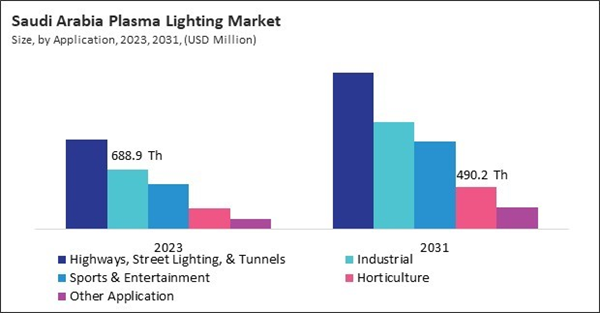The Brazil market dominated the LAMEA Plasma Lighting Market by Country in 2023, and is expected to continue to be a dominant market till 2031; thereby, achieving a market value of $10.37 millions by 2031. The Argentina market is expected to witness a CAGR of 7.8% during 2024-2031. Additionally, the UAE market would register a CAGR of 6.2% during 2024-2031.
Plasma lighting is renowned for its exceptional durability, which allows it to perform reliably in challenging environments. Unlike conventional lighting systems that degrade quickly under adverse conditions, plasma lights are engineered to endure extreme temperatures, high humidity, and substantial vibration without compromising performance. This makes plasma lighting suitable for outdoor and industrial applications with common environmental stresses. For instance, in regions with intense heat, such as the Middle East, plasma lighting can operate effectively in sweltering conditions that would shorten the lifespan of traditional lighting systems.
One prominent example of plasma lighting's durability is its application in outdoor stadiums and sports arenas, where lighting must be resilient enough to handle weather conditions and the intense demands of frequent use. Plasma lighting’s robust design ensures it can manage the large, open areas typical of stadiums and provide bright, high-quality light for athletes and spectators.
South Africa is increasingly adopting plasma lighting in its sports and entertainment venues, focusing on improving the fan experience and optimizing energy efficiency in stadium lighting. Venues like FNB Stadium in Johannesburg benefit from plasma lighting’s high color rendering and uniform illumination, which enhance visibility for both live and broadcast audiences.
The South African government has also introduced energy efficiency guidelines for public facilities, encouraging the adoption of environmentally friendly lighting solutions. As the country continues to host major sports events, the shift to plasma lighting allows South Africa to meet energy standards while elevating the quality of its sports and entertainment infrastructure. Hence, all these factors will aid in the expansion of the market.
List of Key Companies Profiled
- Gavita International B.V.
- BIRNS, Inc.
- Hive Lighting, Inc.
- Pure Plasma Lighting Inc.
- LG Electronics, Inc. (LG Corporation)
- Green de Corp.
- Solaronix SA
- Light Emitting Designs
- Stray Light Optical Technologies
Market Report Segmentation
By Component
- Bulb Assembly
- Cavity Resonator
- Waveguide
- Lightron
By
Wattage
- 300W
- 700W
- 1000W
By Application
- Highways, Street Lighting, & Tunnels
- Industrial
- Sports & Entertainment
- Horticulture
- Other Application
By Country
- Brazil
- Argentina
- UAE
- Saudi Arabia
- South Africa
- Nigeria
- Rest of LAMEA
Table of Contents
Companies Mentioned
- Gavita International B.V.
- BIRNS, Inc.
- Hive Lighting, Inc.
- Pure Plasma Lighting Inc.
- LG Electronics, Inc. (LG Corporation)
- Green de Corp.
- Solaronix SA
- Light Emitting Designs
- Stray Light Optical Technologies









